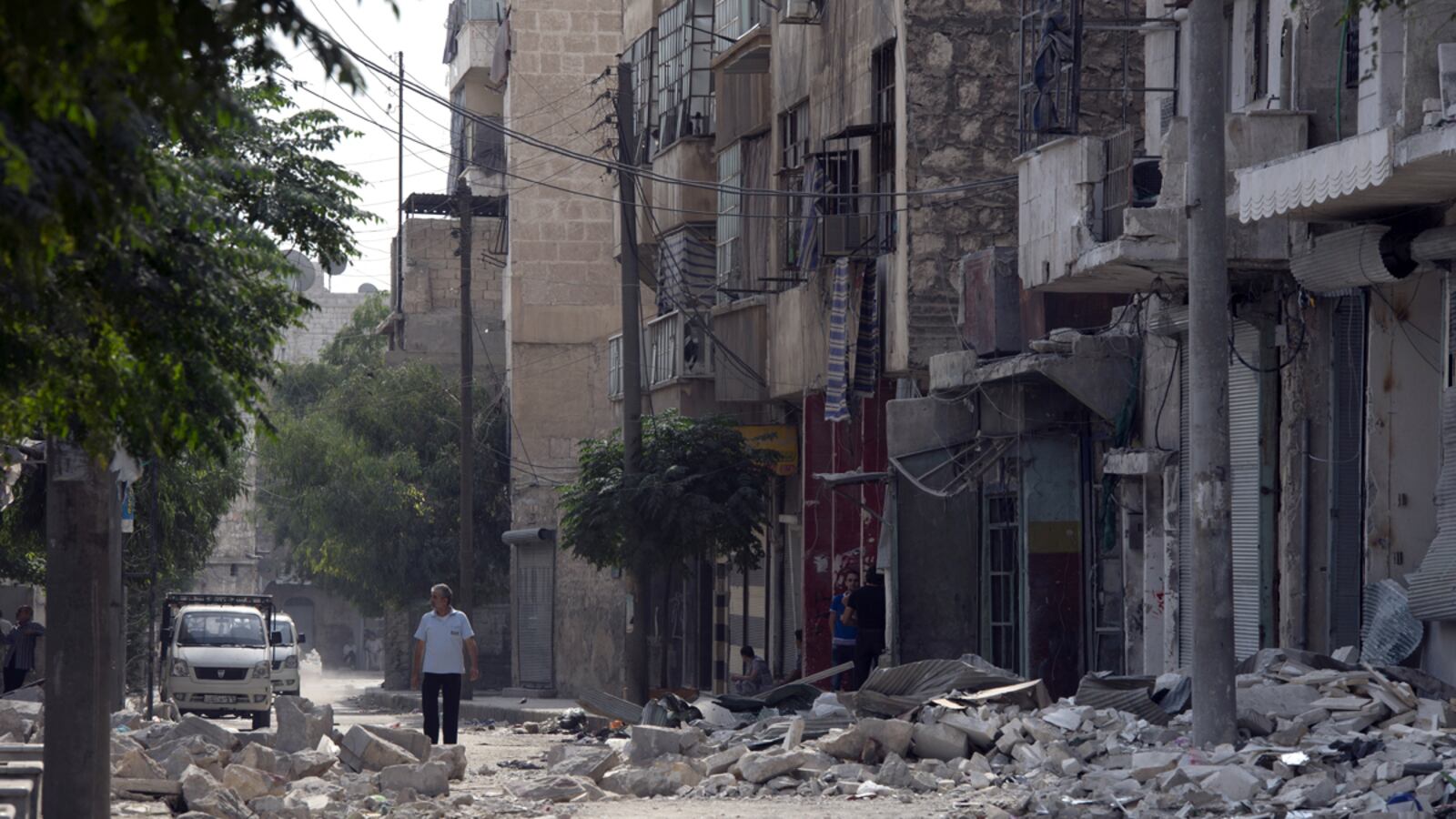Samer Kanjo has been chronicling the destruction of Aleppo since the battle between rebels and government forces began there in July. As the managing editor of Aleppo Today, an opposition news channel covering Syria’s largest city on satellite TV, Kanjo has overseen a steady stream of accounts from the mayhem—from photos of demolished homes and shops to news flashes of tanks rolling through residential streets. He estimates that about half of the city has been either destroyed or badly damaged.
In recent days, a new surge of fighting has seen that destruction reach a fever pitch, with much of the city’s historic souks, the prize of a UNESCO World Heritage site, going up in flames. To Kanjo, the cultural tragedy only served to reinforce a darker theme—that Syrian forces in Aleppo, from his point of view, have become more concerned with wrecking the city than with winning it back. “No government would behave this way unless it was trying to destroy the city,” he says.
Until July, when rebels launched a surprise offensive in Aleppo, it had managed to steer clear of the war gripping other cities such as Homs, as the uprising against Syrian President Bashar al-Assad became an increasingly deadly armed struggle. From the start, the government campaign in Aleppo has relied on an overpowering show of force—launching shells into the city from the outskirts and dropping bombs from the skies, leveling rebel positions and neighborhoods alike. According to an August report by Amnesty International, government forces in Aleppo have frequently targeted civilian areas with “indiscriminate attacks.”
Kanjo has become convinced that standard military objectives are beside the point—houses, factories, and schools, he believes, are targeted on their own, along with key infrastructure such as the water supply. It has not been determined that events like the burning souks and the damaging of one of the city’s main water lines last month were the result of planned regime attacks rather than unintended consequences of the continued fighting. But Human Rights Watch has lambasted the regime for bombing bakeries while residents wait in line for bread. “The regime is targeting regular life in Aleppo,” Kanjo says. “It has nothing to do with fighting a war.”
Numerous reports from Aleppo have shown that some residents blame the rebels for bringing the destruction their way. And many observers say the Assad regime remains convinced it can prevail in Aleppo, the country’s commercial center and a critical center of power. But military analysts see little in the way of a plan for taking it back. “I don’t know whether there’s a coherent, well-planned strategy beyond a heavy reliance on artillery and air power,” says Shashank Joshi, a research fellow at the Royal United Services Institute in Britain.

Instead, as elsewhere in the country, analysts say, the regime seems to be holding violently to those areas it can control, while bringing devastation to those that it can’t. “The regime uses scorched-earth tactics throughout the country—destroying homes and shops, burning fields,” says Jeffrey White, a defense fellow at the Washington Institute for Near East Policy.
While the rebels don’t seem ready to make any game-changing gains of their own in what is often described as a stalemate, many believe that time in Aleppo is on their side. Some see the Assad regime’s rampant destruction of the city as a sign that it has already conceded the fight, reasoning that it plans to weaken the city as much as possible before leaving it to them. “There is so much money and power in Aleppo,” says Maajid Raslan, a rebel from the seaside city of Latakia who is based in the rebel-controlled mountains on its outskirts. “The regime wants to destroy everything possible in Aleppo before it pulls out.”
Raslan believes a retreating regime army would be headed his way. As Assad’s grip on power weakens, there has been speculation over a potential “plan B,” in which the regime retreats to its Latakia stronghold, where the population, unlike in much of Sunni-majority Syria, is predominately Alawite—the offshoot of Shia Islam that makes up the backbone of the Assad regime.
Many in the opposition reject the idea of a Sunni-Alawite divide, insisting that their uprising puts aside sectarian concerns. And they say Latakia would be far from welcoming as a new base for the regime—“A lot of Alawites are against Assad, just like us,” Raslan says. The plausibility of an Alawite enclave, meanwhile, has been a subject for debate. “I'm skeptical of the idea that there is a concerted policy to alter ethnic balances in preparation of an Alawite state, even if the policy in Aleppo could be described as ‘scorched earth,’” Joshi says. “I have seen little sign that there's any appetite for internal secession.”
But Joshua Landis, a Syria expert at the University of Oklahoma and author of the Syria Comment blog, points out that one thing is clear—the Assad regime seems to be running out of options for keeping control of Aleppo, and the stakes in the city are extremely high. “If you’re trying to hold onto the rest of the country, you can’t allow the rebels to have a jewel like Aleppo, which is the source of so much money and commerce, intact. You can’t hand them this golden goose,” he says. “So the idea of a scorched-earth policy has a certain validity to it. It’s not always how the opposition thinks of it—they just say Assad is destroying Syria because he’s evil. But he’d sooner destroy neighborhoods than let them go to the opposition.”
The regime’s apparent strategy, Landis adds, seems to be one that says: “I cannot let them have this for free.”






